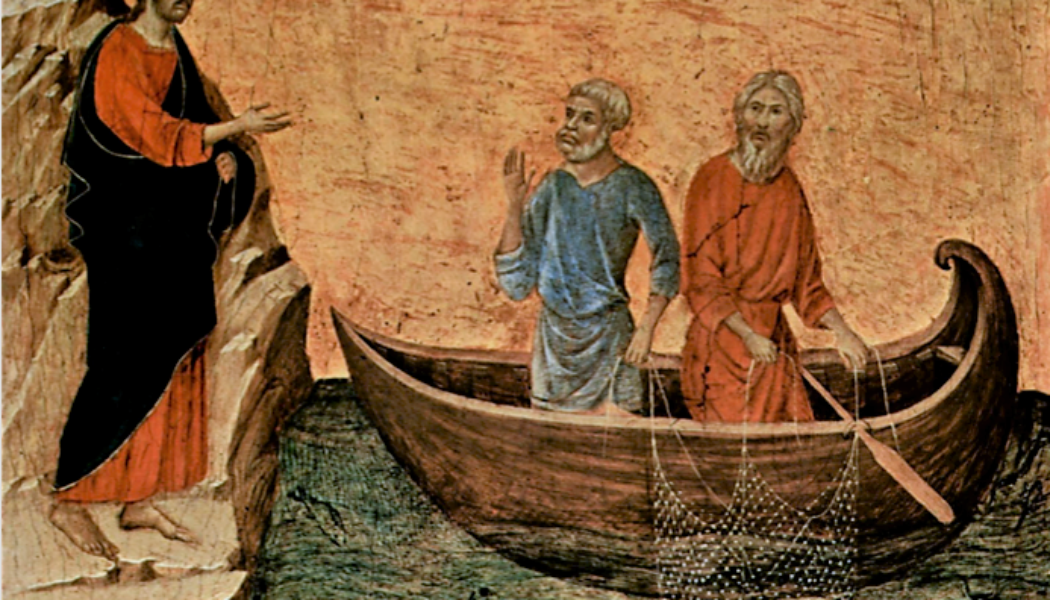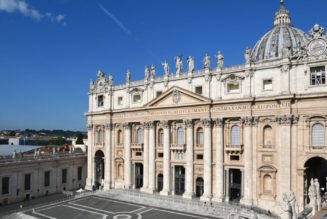
This Sunday’s Gospel describes the call of Simon Peter, one that takes place in several stages. While it is presented in a compact time frame, for most of us it takes place over a longer period, as the Lord works to deepen our faith and heighten our call.
The upshot of the Gospel is that Peter’s faith is strengthened by his obedience to the Lord’s command.
Let’s see how the Lord grows Peter’s faith.
The Help that isn’t Hard – The text says, While the crowd was pressing in on Jesus and listening to the word of God, he was standing by the Lake of Gennesaret. He saw two boats there alongside the lake; the fishermen had disembarked and were washing their nets. Getting into one of the boats, the one belonging to Simon, he asked him to put out a short distance from the shore. Then he sat down and taught the crowds from the boat.
It may astonish us, but God seeks our help. What did Peter have? He had a boat at the ready and, as we shall see, a tender heart. What do you have? All of us have talents, gifts, access, and availability that God can and wants to use. The way the Lord has set things up, He “needs” our help. God, who made us without our help, will not save us without our help. Call this what you will—cooperative grace, collaborative grace, or my personal favorite: responsible grace—but God seeks to engage us in our own salvation and in the salvation of others. He wants our help.
The main point in terms of Peter’s progression in the faith is that this initial request (to put out from shore) is a small one; it’s not hard for Peter and helps him to learn the obedience of faith.
This is where the Lord begins with both Peter and us. He trains us in greater obedience through small things. Don’t overlook the small, daily acts of obedience to the Lord. Through them the Lord trains and equips us for greater things. If the Lord can trust us in small matters, He can and will trust us with larger ones.
The Hesitation that must be Healed – The text says, After he had finished speaking, he said to Simon, “Put out into deep water and lower your nets for a catch.” Simon said in reply, “Master, we have worked hard all night and have caught nothing, but at your command I will lower the nets.”
Peter is willing to do something routine for the Lord. After all, how hard is it to let the Lord use your boat for a while? Now the Lord invites Peter to go a little deeper, to “put out into deep water.” For a moment, Peter hesitates. He is tired and discouraged—so much work and so little to show for it. There was probably some doubt in Peter’s heart and a hint of sarcasm in his voice, because later he repents and calls himself a sinful man. Yes, here is a hesitation that must be healed if Peter is ever to see his blessings and reach his destiny.
So, too, for some of us. Perhaps we’ve heard the Lord calling us to some task but hesitated because we were tired or discouraged. I’ll come to Church and say a few prayers, but please, Lord, don’t ask anything more of me.
Perhaps we are fearful. Deep waters bring greater threats. As the water gets deeper the stakes get higher. Somehow, we must step out in faith, to get out of our comfort zone and head for deeper waters. Like Peter, we can hesitate, thinking of all sorts of reasons why what the Lord asks of us is not a good idea.
How is Peter healed of his hesitation? In a countercultural way, Peter is healed by the obedience of faith; that is the central point of today’s Gospel.
Yes, Peter’s healing is caught up in his acknowledgement that the Lord commands it. Peter says, But at your command I will lower the nets. Peter finds strength and consolation in the Lord’s command. Paradoxically, there is something freeing about being under authority.
We live in a culture that tends to regard authority with cynicism, even rewarding some amount of rebellion. Further, our flesh tends to bristle at being under authority. Again, there is something freeing about being under authority.
As a Christian, I derive a lot of serenity and courage when I understand that the Lord commands something of me. While the world may balk at the demands of the moral life and find much of it too difficult or demanding, I often find that it is enough for me to know that the Lord both teaches and commands it. This gives me both serenity and confidence. Even if some aspect of my flesh may hesitate, knowing that my Lord and His lawful representatives (my bishop and the Magisterium) command something frees me and gives me the courage to understand that I am doing God’s will. Any natural hesitancy I might have is often quickly dispatched when I realize that I am being commanded by the Lord.
On a given Sunday morning, a person might consider skipping Mass, preferring to sleep in or perhaps finding it difficult somehow. Knowing that it is commanded (the third commandment) helps him to overcome his hesitancy. The same is true for the rest of the moral law and also certain vocational matters and actions required of the Christian, not under a general command but under a specific call from the Lord.
In this way of obedience, the Lord draws Peter to deeper waters. Peter’s hesitation must be healed if he is to see his faith deepen and his call heighten.
The Harvest that is Hauled – The text says, When they had done this, they caught a great number of fish and their nets were tearing. They signaled to their partners in the other boat to come to help them. They came and filled both boats so that the boats were in danger of sinking.
In this matter the Lord grants Peter a great grace: enjoying the fruits of obedience in an immediate way. In other cases, the harvest is not so swift, but this much is always true: it is promised, and it will come, whether today or years from now.
The Lord says elsewhere, using a more terrestrial image, the harvest is plentiful (Mat 9:37). The Lord is providing an audiovisual aid. Obviously, the harvest that the Lord heralded was not about fish; it was about human beings. Indeed, the harvest is plentiful. Consider all the people whom the Lord has touched after these humble beginnings in a backwater of Israel. Not only are there more than one billion Catholics in the world today, but there are countless others who lived before us and many (only God knows how many) who will come after us. Yes, it is a bountiful harvest!
Some days and times are better for fishing or harvesting than others. St. Paul speaks of the gospel as being “in season and out of season” (2 Tim 4:2), but even in those times that the Lord designates for pruning or for the field to lie fallow, He is only preparing for future growth. The Lord says, “the harvest is plentiful,” and His Word prevails.
In the West it seems that the seasons have turned against us, but we must remember that even in winter the farmer must stay busy preparing the soil, removing the rocks, and laying down fertilizer.
Yes, the Lord is heralding a harvest, and we must work no matter the season. Even if we do not see the full harvest, the Lord will, as will others who come after us. Jesus says elsewhere, Thus the saying “One sows, and another reaps” is true. I sent you to reap what you have not worked for. Others have done the hard work, and you have reaped the benefits of their labor” (John 4:37).
The bottom line is this: just do your work. Obey what the Lord commands and know that a harvest is heralded and will be hauled in someday. The nets will be strained, and the boats heavily weighed down. The harvest will come, and it will come with abundance. Just keep working and obeying what He commands.
The Humility that Heightens – The text says, When Simon Peter saw this, he fell at the knees of Jesus and said, “Depart from me, Lord, for I am a sinful man.” For astonishment at the catch of fish they had made seized him and all those with him, and likewise James and John, the sons of Zebedee, who were partners of Simon. Jesus said to Simon, “Do not be afraid; from now on you will be catching men.” When they brought their boats to the shore, they left everything and followed him.
In falling to his knees, Peter is about to raised higher by the Lord. Peter realizes that his hesitation and doubt have been sinful and that had he persisted in not obeying the Lord, he would have blocked his blessings.
Notice that Peter is not described as having a cringing humility but rather a healthy one.
Healthy humility raises us; it does not cast us down. Bowing in healthy humility does not crush us; it heightens our status. The Lord, having led Peter to a healthy obedience and humility, in effect tells him, “Come up higher. Your concern now will not be fish but rather the care of human souls who are precious to me. You will be my co-worker in a far more important enterprise.” Yes, healthy humility raises us.
Thus, Peter’s humility is a productive one. It is the godly sorrow of which St. Paul writes,
Even if I caused you sorrow by my letter, I do not regret it. Though I did regret it—I see that my letter hurt you, but only for a little while—yet now I am happy, not because you were made sorry, but because your sorrow led you to repentance. For you became sorrowful as God intended and so were not harmed in any way by us. Godly sorrow brings repentance that leads to salvation and leaves no regret, but worldly sorrow brings death. See what this godly sorrow has produced in you: what earnestness, what eagerness to clear yourselves, what indignation, what alarm, what longing, what concern, what readiness to see justice done (2 Cor 7:8-11).
Peter’s humility is productive because it is godly. Humility and sorrow equip him for greater duties, duties no longer related fish but to human souls.
How different this is from mere shame (which Paul calls worldly sorrow)! Shame often locks us into unhealthy, paralyzing self-loathing. Godly sorrow increases our zeal to do God’s will and thereby equips, empowers, and enables us when He calls—and the Lord does call.
Peter, through obedience and humility, is now ready to leave everything and follow Jesus. The Lord has led him to this point in stages. It began with a request for help that wasn’t hard, a small obedience, but then the Lord called Peter deeper, to a more difficult obedience. Peter needed to have his hesitation healed. Experiencing this healing, he hauled in a harvest that illustrated what his lack of faith and obedience might have cost him. It humbled him but also heightened him. Having his faith deepened in Jesus, Peter is now ready to follow the Lord. It is always better to walk in humility and obedience than in pride!
In all of this, don’t miss the key, the golden chord: At your command, I will lower the nets. Faith is rooted in obedience and humility. That is the key to our growth as disciples.
St. Peter is still a rookie, but his first season holds great promise. He will not go through life without injury, but in the end, he too will be the rock (in Christ) who is ready to roll.
[embedded content]
Join Our Telegram Group : Salvation & Prosperity









